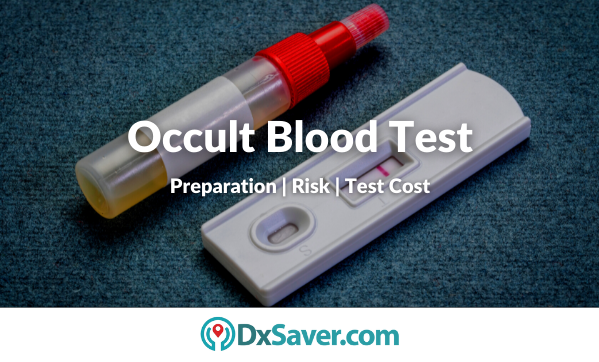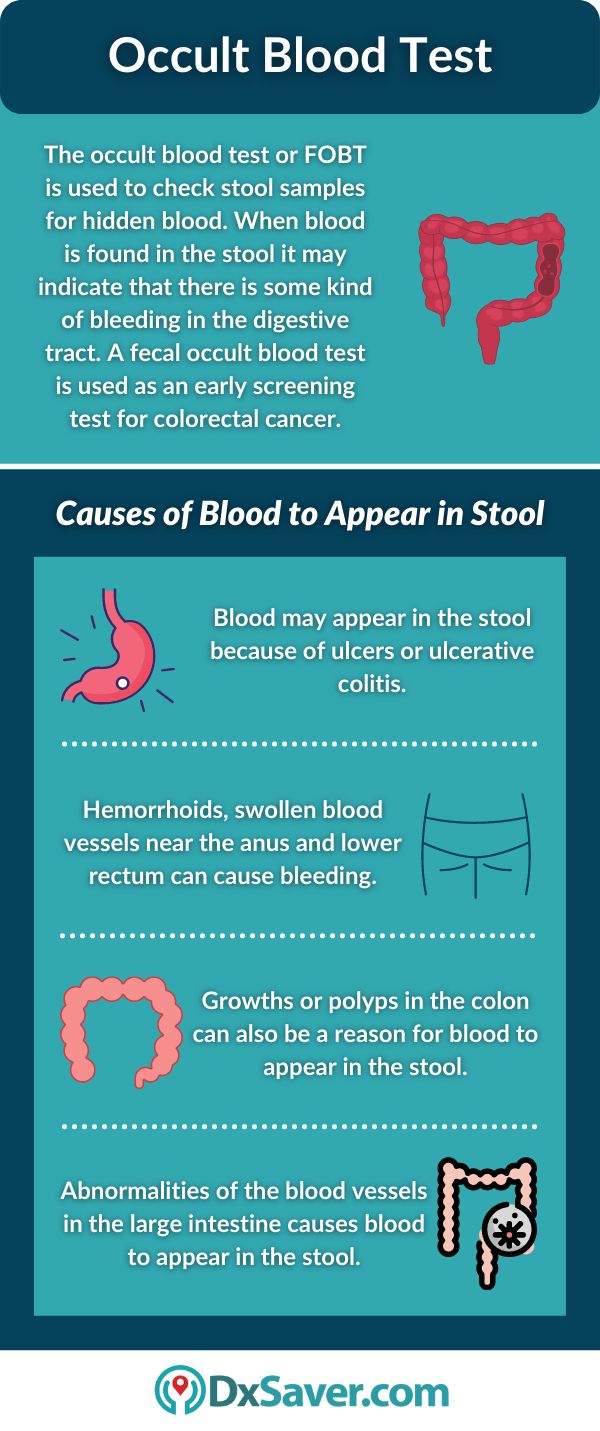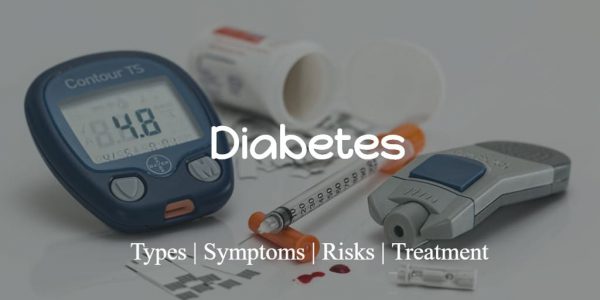
An occult blood test (FOBT, gFOBT, or immunochemical FOBT) looks at a sample of feces to check for blood. Blood in the stool can be caused by a variety of conditions and may also be a sign of colorectal cancer. The risk of developing colorectal cancer is 1 in 25 for women and 1 in 23 for men. The FOBT or occult blood test acts as an important screening tool against colorectal cancer. And has been shown to reduce the number of deaths from colorectal cancer by 18% to 33%. This test may be part of a routine examination and it is recommended annually for adults over age 50.
This article covers all the significant topics related to occult blood tests such as the test cost, preparation for the occult blood test, risk factors, and how to get tested for an occult blood test.
- What is an occult blood test?
- What causes blood to appear in the stool?
- Preparing for the occult blood test
- Risk of occult blood test
- Types of occult blood test
- Who should get tested for an occult blood test?
- What do the results mean?
- How often do you need this test?
- Other stool tests for colorectal cancer
- Provider locations
How much does the occult blood test cost?
Occult blood test costs range from $86 to $90 in different labs and facilities across the US. Prior appointment isn’t required. You can order tests online by comparing the price or visiting the nearest lab during lab business hours. You will get the results in your email in 2 to 3 business days after completing the procedure. Apart from this, doctor consultation is available for any kind of further treatment or medical advice.
The table below shows the occult blood test provider and their prices. You can know more and book the test by clicking on the “Book Now” button. All the labs are CLIA-certified and offer a network across the US.
Name of our Partner Labs | Book Online at Offer Price |
HealthLabs
| $90 |
Personal Testing Lab
| $86 |
Occult blood test cost with insurance
Many insurance companies in the U.S. cover all the vital tests like an occult blood test. However, the coverage provided by private health insurance companies and national health insurance programs like Medicare varies widely. Most of the health insurance policies cover occult blood test costs only once or twice a year and when your physician orders more than twice in a year, you should pay the test cost out of pocket. So, you are recommended to check if your health insurance policy covers the occult blood test cost.
Our occult blood testing providers do not accept any kind of health insurance policy. However, they can provide you with an itemized receipt containing all the details viz the name of the test, code of the test, and CPT code which is necessary for insurance reimbursement purposes.
What is an occult blood test?
The occult blood test or fecal occult blood test (FOBT) is used to check stool samples for hidden or occult blood. Blood in the stool may indicate that there is some kind of bleeding in the digestive tract. This can be caused by a variety of conditions, like polyps, diverticulosis, colitis, etc. And blood in the stool can also be a sign of colorectal cancer. It is important to note that not all cancers and polyps bleed. When blood is detected, additional tests are required to determine the source of the bleeding. This test can only detect the presence or absence of blood and is not intended to determine the cause of bleeding.
What causes blood to appear in the stool?
- Growths or polyps in the colon
- Abnormalities of the blood vessels in the large intestine
- Intestinal infections that cause inflammation
- Ulcers
- Ulcerative colitis
- Crohn’s disease
- Hemorrhoids
- Anal fissures
- Diverticular disease
Preparing for the occult blood test
Several foods, dietary supplements, and medications can affect the results of some tests by indicating either false-positive or false-negative. So, doctors may ask you to avoid certain foods or medicines. Since the test results can be affected by how you prepare for the test, it is essential to follow the instructions carefully.
- A special diet is recommended for 48-72 hours before the test. Red meat (like beef, lamb, or liver), raw fruits, raw vegetables, vitamin C, fruit juices with vitamin C and vitamin C supplements in doses higher than 250 milligrams (mg) per day, antacids, iron supplements, and medications to stop diarrhea should be avoided during that time.
- Nonsteroidal anti-inflammatory drugs (NSAIDs) like ibuprofen, naproxen, aspirin & vitamin E should be avoided for seven days before your test. Because these medications may cause small amounts of blood to appear in your stool. If you take aspirin for heart problems, consult the health care provider before stopping your medicine. Acetaminophen may be safe to use during this time, but it is important to check with your health care provider before taking it.
If you are having a menstrual period, bleeding hemorrhoids (swollen veins in your anus), or blood in the urine (pee) talk with your healthcare provider before taking the test.

Risk of occult blood test
There are no physical risks in the test itself. This test could show a negative test result when cancer is present (false-negative) when cancer or polyps don’t bleed. Or it can show a positive test result when you have no cancer (false-positive) when you have bleeding from other sources, like stomach ulcer, hemorrhoid, or even blood swallowed from the mouth or nose.
Types of occult blood test
Although the methods are slightly different, the objective of all FOBT is to detect blood in the stool. As polyps and abnormalities do not bleed every day, several samples are taken in a fecal occult blood test. When doctors and laboratories view samples over consecutive days, the chance for error will be less.
- Guaiac fecal occult blood test or gFOBT – During this test, the doctor gives a test card that is used to collect stool samples from multiple bowel movements. You should place a stool sample on a test card coated with guaiac (a substance that is plant-based). The color of the card changes, when there is blood in the stool. And for interpreting you need to send the card back to your doctor’s office or the laboratory. For this test, you must abstain from certain foods and medications beforehand to help ensure accuracy.
- Immunochemical fecal occult blood test or iFOBT or FIT – Generally, a special spoon or other device is used to collect a sample of stool and store it in a collection container that comes with the test kit. And then the container is returned to the doctor or a designated lab, by mail or in person. FIT is preferred over the guaiac fecal occult blood test as it is more sensitive. And this test does not require any dietary restrictions before sample collection. The testing can be done on a random stool sample.
- Flushable reagent pad or tissue – This test is available over-the-counter at a store without a prescription. You need to place the pad or tissue in the toilet bowl after a bowel movement, usually on three separate days. This test works similarly to the gFOBT by using a chemical that changes color if there is blood. And there are certain dietary restrictions you need to follow before you do the test. After completing the procedure, you should send the results to your doctor.
Who should get tested for an occult blood test?
An FOBT may be a good option for the screening of colon cancer. The doctor may recommend screening once per year when you are age 50 or older. The U.S. Preventive Services Task Force recommends screening for colorectal cancer in adults using FOBT, sigmoidoscopy, or colonoscopy.
A person requires screening more often when they have certain risk factors, which may include excessive cigarette smoking, alcohol use, obesity, and a family history of colorectal cancer. Additionally, this testing can reflect many other gastrointestinal conditions that cause blood in the stool.
What do the results mean?
An occult blood test is considered negative when blood is not detected in the stool samples. Doctors may recommend repeating the test yearly when you have an average risk of colon cancer. And is considered positive when blood is detected in the stool samples. In this case, you may need additional testing like colonoscopy to determine the source of the bleeding.
How often do you need this test?
Consult the health care provider about which test is right for you. There are other methods like colonoscopy, CT colonography (virtual colonoscopy), and tests that check your stool for cancer DNA. The preferred screening method for colorectal cancer is colonoscopy. But if you decide to take fecal occult blood tests, you need to do that every year. This test may be done along with a flexible sigmoidoscopy and barium enema every five years to check for colorectal polyps or cancer. It is important to note that, when the test shows signs of blood, you may probably still need to get a colonoscopy.
Other stool tests for colorectal cancer
The stool DNA test or FIT-DNA test is another option for early detection. This test can detect blood in the stool and spots cellular changes that could mean you have cancer or pre-cancerous polyps. Use a kit at home to collect a stool sample and send the sample to a lab for analysis. And the test is still being studied to see how well it works to find colorectal cancer.
Provider Locations
An occult blood test can be done in any of the following locations by visiting the lab near you. To know the occult blood test cost, refer to the first section of the article.
- Alabama
- Alaska
- Arizona
- Arkansas
- California
- Colorado
- Connecticut
- Delaware
- Florida
- Hawaii
- Georgia
- Idaho
- Illinois
- Indiana
- Iowa
- Kansas
- Kentucky
- Louisiana
- Maine
- Michigan
- Minnesota
- Mississippi
- Missouri
- Montana
- Nebraska
- Nevada
- New Hampshire
- New Mexico
- North Carolina
- North Dakota
- Oklahoma
- Oregon
- Pennsylvania
- Puerto Rico
- South Carolina
- South Dakota
- Tennessee
- Texas
- Utah
- Vermont
- Virginia
- Washington
- West Virginia
- Wisconsin
- Wyoming
Frequently Asked Questions
Will insurance cover my testing cost?
No, insurance will not be covered in the billing. However, they will provide you with a receipt for insurance reimbursement purposes.
How should I book my appointment?
You can choose the most suitable provider from above and make an appointment by following the instructions mentioned by them.
Can I cancel my lab test order?
Yes, you can cancel your lab test order any time before your testing. A refund will be initiated after deducting the cancellation fee. However, cancellation is at the discretion of the provider.
Do the providers offer result interpretations?
Yes, a few providers may provide doctor consultation who will take you through the results and provide clarification if needed.
How do I receive my report?
To ensure your privacy, the test report will be mailed to you by the provider.
Other topics you may also be interested in:-
- Stages of colon cancer and its symptoms
- Causes and Symptoms of Zika Virus
- Statin Panel Blood Testing in the US
- Herpes STD Testing Cost in the US
- What is a Titer Test?
- Importance of Aldosterone to Renin Ratio
- What are the symptoms of Lung cancer?
- What is the Myasthenia Gravis Test?
- GGT, Gamma-GT Blood Test Cost in the US
- Importance of CA 125 Testing & Ovarian Cancer in Women
- What is RDW in the Blood Test?
- How much does Calcium Blood Test Cost in the US?
- Importance of BNP Levels in Blood
- Fitness Testing Cost in the US
- D-dimer test cost in the US
- Heavy Metal poisoning symptoms, types & diagnosis
- Fibrinogen Test Cost in the U.S.






